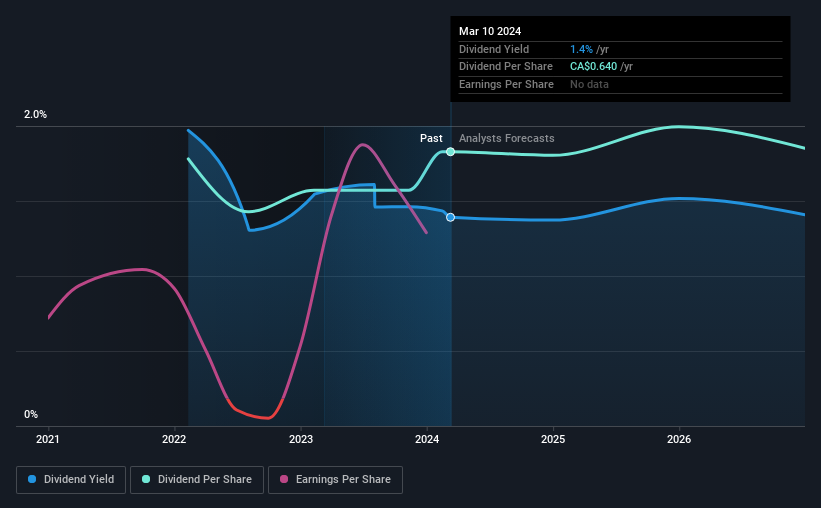Definity Financial Corporation (TSE:DFY) stock is about to trade ex-dividend in three days. The ex-dividend date will be one day before the record date. The record date is the date on which a shareholder must appear on the company's books in order to receive the dividend. The ex-dividend date is important because trades in the stock must be settled before the record date in order to receive the dividend. Therefore, if he purchases Definity Financial shares after March 14th, he will not be entitled to receive the dividend, although it will be paid on March 28th.
The company's next dividend payment will be CA$0.16 per share, and in the last 12 months, the company paid a total of CA$0.64 per share. Based on the last year's worth of payments, Definity Financial has a current yield to trail of 1.4% on the current stock price of CA$46.00. If you buy this business for its dividend, you need to understand whether Definity Financial's dividend is reliable and sustainable. We need to see if the dividend is covered by profit and if it's growing.
Check out our latest analysis for Definity Financial.
Dividends are usually paid out of a company's profits. If a company pays more in dividends than it earned in profit, then the dividend might become unsustainable. Definity Financial paid out a profit of just 18% last year, which is conservatively low and we think it leaves plenty of headroom for the unexpected.
Companies that pay out less in dividends than they earned in profit generally have more sustainable dividends. The lower the payout ratio, the more leeway a company has before being forced to cut its dividend.
Click here to see the company's payout ratio and analyst estimates of its future dividends.


Are profits and dividends growing?
Stocks in companies that generate sustainable earnings growth often offer the best dividend prospects, since it's easier to lift dividends when earnings are rising. If profits decline and the company is forced to cut its dividend, investors could see the value of their investments explode. It's encouraging to see that Definity Financial has been growing its earnings rapidly over the past three years, up 27% per year.
Many investors assess a company's dividend performance by evaluating how much the dividend payments have changed over time. Since the beginning of our data two years ago, Definity Financial has raised its dividend by an average of about 1.3% per year. It's good to see that both earnings and dividends have improved, but the former has risen much faster than the latter, likely because the company is reinvesting more of its profits into growth.
conclusion
Is Definity Financial worth buying for its dividend? Fast-growing companies like Definity Financial typically pay out a small percentage of their earnings, but reinvest significant amounts into the business. Masu. This strategy can create significant value for shareholders over the long term, as long as it doesn't issue too many new shares. Overall, our analysis makes Definity Financial look like a promising dividend stock, and we think it's worth investigating further.
Want to know what other investors think about Definity Financial? Visualize past and future estimated earnings and cash flow to see what analysts are predicting.
Generally speaking, we don't recommend just buying the first dividend stock you see.Here it is A curated list of interesting stocks with strong dividends.
Have feedback on this article? Curious about its content? contact Please contact us directly. Alternatively, email our editorial team at Simplywallst.com.
This article by Simply Wall St is general in nature. We provide commentary using only unbiased methodologies, based on historical data and analyst forecasts, and articles are not intended to be financial advice. This is not a recommendation to buy or sell any stock, and does not take into account your objectives or financial situation. We aim to provide long-term, focused analysis based on fundamental data. Note that our analysis may not factor in the latest announcements or qualitative material from price-sensitive companies. Simply Wall St has no position in any stocks mentioned.


